Caryn’s Thoughts
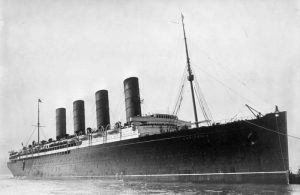 Most people have heard of the Titanic sinking, and how disaster could have been prevented, had they just slowed down, listened to the warnings, and had they had enough lifeboats. There is, however, another ship sinking that not so many people have heard of, or if they had, they didn’t pay much attention to. It is the Lusitania. Like the Titanic, the sinking of the Lusitania could have been prevented too, had a number of simple precautions been taken, such as not to sail at all that fateful May day in 1915.
Most people have heard of the Titanic sinking, and how disaster could have been prevented, had they just slowed down, listened to the warnings, and had they had enough lifeboats. There is, however, another ship sinking that not so many people have heard of, or if they had, they didn’t pay much attention to. It is the Lusitania. Like the Titanic, the sinking of the Lusitania could have been prevented too, had a number of simple precautions been taken, such as not to sail at all that fateful May day in 1915.
RMS Lusitania left New York for Britain on May 1, 1915, unfortunately during a time when German submarine warfare was intensifying in the Atlantic. On February 4, 1915, Germany had declared the seas around the United Kingdom a war zone, and the German embassy in the United States had placed newspaper advertisements warning people of the dangers of sailing on Lusitania. Not to defend the Germans, but they had warned people that they would attack all ships, military or passenger. Unfortunately, not many people boarding Lusitania that morning had time to read the paper before embarking on their journey. It amazes me that it was left to the people, who were told that the ship could outrun the German U-boats. They were also told that they 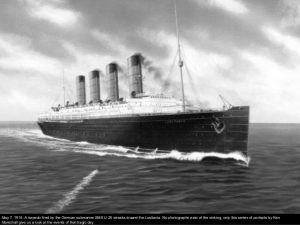 would have escort ships as they entered the war zone. And, they were told that the U-boats were not attacking neutral passenger liners. Unfortunately, these things were not factual. Part of the problem was that the Allies had begun disguising war ships as passenger ships on the assumption that the Germans would not attack passenger ships. Other passenger ships were actually used to transport soldiers and ammunition, or even just ammunition, in the thought that they would be safe from harm that way. The Allies were also supposed to have escort ships to take the passenger ships, but that did not happen in the case of the Lusitania.
would have escort ships as they entered the war zone. And, they were told that the U-boats were not attacking neutral passenger liners. Unfortunately, these things were not factual. Part of the problem was that the Allies had begun disguising war ships as passenger ships on the assumption that the Germans would not attack passenger ships. Other passenger ships were actually used to transport soldiers and ammunition, or even just ammunition, in the thought that they would be safe from harm that way. The Allies were also supposed to have escort ships to take the passenger ships, but that did not happen in the case of the Lusitania.
The sinking of the Cunard ocean liner RMS Lusitania occurred on Friday, May 7, 1915 during the First World War, as Germany waged submarine warfare against the United Kingdom which had implemented a naval blockade of Germany. The ship was identified and torpedoed by the German U-boat U-20 and sank in just 18 minutes, and also took on a heavy starboard list. The Lusitania went down 11 miles off the Old Head of Kinsale, 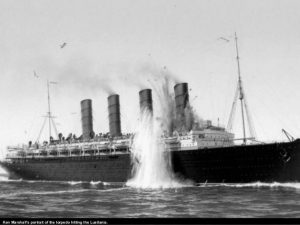 Ireland, killing 1,198 and leaving 761 survivors. The sinking turned public opinion in many countries against Germany, and it was a key element in the American entry into World War I. The torpedoing and subsequent sinking became an iconic symbol in military recruiting campaigns. The injustice of it brought about the outrage that would likely cause soldiers to enlist. Still, the United States did not immediately enter into the war. The American government first issued a severe protest to Germany…a waste of time really. Then, following immense pressure from the United States and recognizing the limited effectiveness of the policy, Germany abandoned unrestricted submarine warfare in September 1915.
Ireland, killing 1,198 and leaving 761 survivors. The sinking turned public opinion in many countries against Germany, and it was a key element in the American entry into World War I. The torpedoing and subsequent sinking became an iconic symbol in military recruiting campaigns. The injustice of it brought about the outrage that would likely cause soldiers to enlist. Still, the United States did not immediately enter into the war. The American government first issued a severe protest to Germany…a waste of time really. Then, following immense pressure from the United States and recognizing the limited effectiveness of the policy, Germany abandoned unrestricted submarine warfare in September 1915.
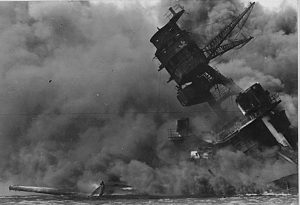 Shortly after the Japanese attacked Pearl Harbor, they were bent on making the most of the advantage they had, or perceived to have had. As we know the advantage was much less than they thought it was, but the United States did need a little bit of time to regroup and prepare for their entrance into World War II. The invasion of the Philippines started on December 8, 1941, just ten hours after the attack on Pearl Harbor. The US military had just lost ships and personnel, and understandably, the Japanese saw the opportunity to take advantage of the chaos. As at Pearl Harbor, American aircraft were severely damaged in the initial Japanese attack on the Philippines. A lack of air cover, forced the American Asiatic Fleet in the Philippines withdrew to Java on December 12, 1941. General Douglas MacArthur was ordered out of harms way. He was sent to Australia, 2485 miles away, unfortunately leaving his men at Corregidor on the night of March 11, 1942. Cutting off supplies, the Japanese finally forced 76,000 starving and sick American and Filipino defenders in Bataan to surrender on April 9, 1942. They were then forced to endure the infamous Bataan Death March on which 7,000 to 10,000 people died or were murdered.
Shortly after the Japanese attacked Pearl Harbor, they were bent on making the most of the advantage they had, or perceived to have had. As we know the advantage was much less than they thought it was, but the United States did need a little bit of time to regroup and prepare for their entrance into World War II. The invasion of the Philippines started on December 8, 1941, just ten hours after the attack on Pearl Harbor. The US military had just lost ships and personnel, and understandably, the Japanese saw the opportunity to take advantage of the chaos. As at Pearl Harbor, American aircraft were severely damaged in the initial Japanese attack on the Philippines. A lack of air cover, forced the American Asiatic Fleet in the Philippines withdrew to Java on December 12, 1941. General Douglas MacArthur was ordered out of harms way. He was sent to Australia, 2485 miles away, unfortunately leaving his men at Corregidor on the night of March 11, 1942. Cutting off supplies, the Japanese finally forced 76,000 starving and sick American and Filipino defenders in Bataan to surrender on April 9, 1942. They were then forced to endure the infamous Bataan Death March on which 7,000 to 10,000 people died or were murdered.
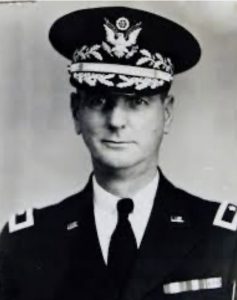
The 13,000 survivors on the island of Corregidor surrendered on May 6, 1942. It was the last holdout against the Japanese in the Philippines. The surrender of the Philippines and Corregidor was not only a sad thing…it was a death sentence for many. The island of Corregidor under the command of General Jonathan Wainwright, was hit by constant artillery shelling and aerial bombardment attacks, which ate away at the American and Filipino defenders. The troops at Corregidor managed to sink many Japanese barges as they approached the northern shores of the island with necessary supplies, but finally, cut off from supplies, the Allied troops couldn’t hold the invader off any longer. General Wainwright, who had only recently been promoted to the rank of lieutenant general and commander of the US armed forces in the Philippines, offered to surrender Corregidor to Japanese General Homma, but Homma wanted the complete, unconditional surrender of all American forces throughout the Philippines. Wainwright had little choice given the odds against him and the poor physical condition of his troops. He had already lost 800 men. He surrendered at midnight. All 11,500 surviving Allied troops were evacuated to a prison stockade in Manila.
The Japanese did not care about any kind of proper treatment of the prisoners of war. Men were beaten,  starved, and worked to death. Many of the men who surrendered at Corregidor were sent to Japan to work there. No one knew where they were, or even if they were still alive. At first, it was thought that they were in the prison camps, but people only later heard that their loved one was…who knew where. General Wainwright remained a POW until 1945. I’m sure the US government felt bad that they couldn’t help him, and so he was invited to the USS Missouri for the formal Japanese surrender ceremony on September 2, 1945. He was also be awarded the Congressional Medal of Honor by President Harry S Truman. Wainwright died in 1953…eight years to the day of the Japanese surrender ceremony.
starved, and worked to death. Many of the men who surrendered at Corregidor were sent to Japan to work there. No one knew where they were, or even if they were still alive. At first, it was thought that they were in the prison camps, but people only later heard that their loved one was…who knew where. General Wainwright remained a POW until 1945. I’m sure the US government felt bad that they couldn’t help him, and so he was invited to the USS Missouri for the formal Japanese surrender ceremony on September 2, 1945. He was also be awarded the Congressional Medal of Honor by President Harry S Truman. Wainwright died in 1953…eight years to the day of the Japanese surrender ceremony.
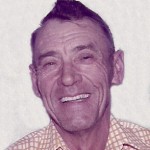
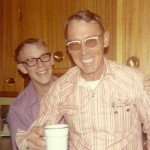 Walt Schulenberg left us to go to Heaven, and sometimes that makes sense in my head, but most times, it just seems impossible. The years march on, and our lives get busy, and before we know it much more time has passed that we ever thought possible.
Walt Schulenberg left us to go to Heaven, and sometimes that makes sense in my head, but most times, it just seems impossible. The years march on, and our lives get busy, and before we know it much more time has passed that we ever thought possible.
My father-in-law was a big part of my life…he was my second dad, and I was extremely blessed by both of my dads. They were different men in many ways, but they were also very similar in many ways too. That is probably what endeared my father-in-law to me in the first place. He had such a sweet and kind spirit. How could I have felt anything but welcome. He had a wonderful sense of humor and I found myself laughing at his antics every time. From the first time I met him, I felt like I was one of his kids too. Not everyone has the ability to make people feel that way, but Walt Schulenberg did.
Through the years, Dad could always be counted on to help with the many project a life produces. He never complained. He did it out of love…love for his kids and his grandkids, and later his great grandkids. His children blessed him with many of these, and he, in turn, blessed them with many treasures, material yes, but also the treasures of his heart and the love he had for them. We were all blessed by the love he had for us.
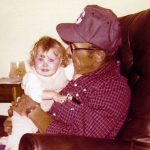
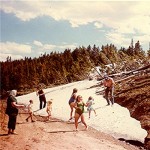
Dad was a hard working man. He was a loyal employee, and well liked by his bosses over the years. I think one of his favorite jobs was the one he had driving T-Birds of Casper College to many of their sporting evens and such. It gave him the opportunity travel around and still get paid for it…plus, he loved the kids. I think he always enjoyed young people, because they were so full of life. I think that is one of the things I loved most about my father-in-law…he was full of life. Life has been very different since he left us, and we miss him very much.
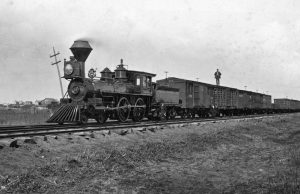 Flood waters carry with them more damage than people imagine. Water just doesn’t seem like the force it can become. That was exactly what had happened in May of 1878. The flood waters came rushing down the creek overnight, and the force of the water had wiped out a bridge at Box Elder, Montana. The section foreman discovered the missing bridge and rushed to secure a red light for the purpose of signaling the Kansas Pacific freight train. He knew the train was due any minute. Before he could avoid the approaching disaster, the train thundered down upon the chasm left by the missing bridge, and into the torrent of wild waters below.
Flood waters carry with them more damage than people imagine. Water just doesn’t seem like the force it can become. That was exactly what had happened in May of 1878. The flood waters came rushing down the creek overnight, and the force of the water had wiped out a bridge at Box Elder, Montana. The section foreman discovered the missing bridge and rushed to secure a red light for the purpose of signaling the Kansas Pacific freight train. He knew the train was due any minute. Before he could avoid the approaching disaster, the train thundered down upon the chasm left by the missing bridge, and into the torrent of wild waters below.
The accident occurred about 12 o’clock that Tuesday night, three employees lost their lives, and a whole freight train was totaled. John Bacon, of Denver, who was the engineer; his fireman, Frank Sellvin, and another employee named John Piatt, were in the engine, and unable to escape. The whole train had eighteen cars. The fatal blow came when the car that was loaded with railroad iron, came to rest on top of the wreck, burying the men piled upon the wreck and buried the men. They might as well have been buried beneath a mountain. The crews knew it would be several days before they would be able to remove the bodies from the wreckage. Nevertheless, given the way the iron car fell on the engine, it was certain that the three men died instantaneously…or nearly so.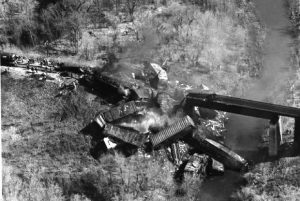
In a bizarre twist, the body of Frank Sellvin turned up, not under the wreckage, but a mile and a half from where that accident occurred. It appeared that he jumped from the engine as it fell. While trying to save himself, he was instead carried by the raging torrent out of the reach of the wreck, but not out of the clutches of the killer flood waters. By midnight the bodies of the other two men were still missing. It would be a while yet before their bodies would be found. Water seems like something so innocent, but when they become flood waters, they become killer waters.
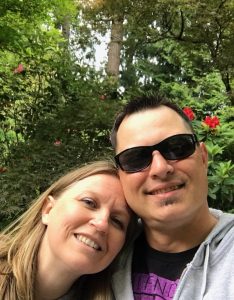 My son-in-law, Travis Royce has surprised me over the years. He didn’t do it intentionally, but rather he just turned out to be different than what I expected him to be. When he and my daughter, Amy live in Ferndale, Washington these days, out in the country, which is totally not what I expected of them. They just didn’t seem the type when they first got married in 1995. Of course, they were kids then, and they were into the typical things that young people were. They music they liked was different than the music I like…well, it still is, so I guess that hasn’t changed. Still the music they like doesn’t normally seem typical of country living.
My son-in-law, Travis Royce has surprised me over the years. He didn’t do it intentionally, but rather he just turned out to be different than what I expected him to be. When he and my daughter, Amy live in Ferndale, Washington these days, out in the country, which is totally not what I expected of them. They just didn’t seem the type when they first got married in 1995. Of course, they were kids then, and they were into the typical things that young people were. They music they liked was different than the music I like…well, it still is, so I guess that hasn’t changed. Still the music they like doesn’t normally seem typical of country living.
Travis is a very social person, another thing that doesn’t seem to fit with country living, but there is another side to Travis too. The side that loves the peace and quiet he finds in his back yard in the country. He loves sitting out in the back yard watching a fire in 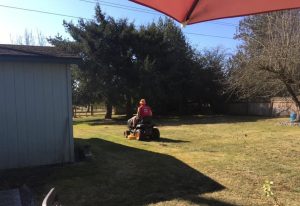 their fire pit. He feels so relaxed there. Don’t get me wrong, Travis still likes to go out, have a few drinks with friends, and do a little gambling, but it’s almost like the ranch family going out to a square dance on a Saturday night, and afterward, head back home to country living. The fact is that as often as not, Travis would rather have people over at their house that go out. When their kids, Shai and Caalab come over, Travis enjoys playing the guitar with Caalab, while the girls sing. I’ve had the privilege of attending some of their little impromptu concerts, and they are
their fire pit. He feels so relaxed there. Don’t get me wrong, Travis still likes to go out, have a few drinks with friends, and do a little gambling, but it’s almost like the ranch family going out to a square dance on a Saturday night, and afterward, head back home to country living. The fact is that as often as not, Travis would rather have people over at their house that go out. When their kids, Shai and Caalab come over, Travis enjoys playing the guitar with Caalab, while the girls sing. I’ve had the privilege of attending some of their little impromptu concerts, and they are 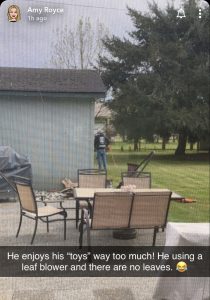 really good. The whole family has talent, and that makes it a lot of fun.
really good. The whole family has talent, and that makes it a lot of fun.
Because Travis loves yard work…or at least mowing the lawn, their yard always looks amazing. And Amy loves flowers, so she adds her special touches, and the effect of lovely. I can understand why they like being out there in the peaceful beauty of their back yard, because I have been there myself and it is very peaceful. Travis loves his yard work so much, and his yard tools too. In fact, that was never more evident than recently when he went out in the back yard and started using his leaf blower. there were no leaves to blow away, so Amy thought the picture was quite comical. Maybe it was, but I think it is also very much Travis. My guess is that while he wasn’t blowing leaves away, h might have seen some dirt or pine needles, and decided that the leaf blower was the best tool for the job. It’s as simple as that. Today is Travis birthday. Happy birthday Travis!! Have a great day!! We love you!!

 If you find yourself south of Cheyenne, Wyoming just north of the Colorado border, and you look to the east of I-25, you might be surprised to see several camels grazing in the fields there. The first time I saw it, I was very surprised, although it is not unheard of to bring animals from one area of the world to another, where it is not common to see such an animal. Nevertheless, it was not a sight that I had seen before.
If you find yourself south of Cheyenne, Wyoming just north of the Colorado border, and you look to the east of I-25, you might be surprised to see several camels grazing in the fields there. The first time I saw it, I was very surprised, although it is not unheard of to bring animals from one area of the world to another, where it is not common to see such an animal. Nevertheless, it was not a sight that I had seen before.
This isn’t the first time camels have spent time in the United States, however. In the mid-1800s, someone else came to the conclusion that camels might be a good alternative to horses or donkeys in the deserts of the Southwest. Camels can go for long periods of time without water, and I’m sure that fact played a part in the decision. The camels were to be used in Arizona, New Mexico, and the deserts of the Colorado River. Some thought it might be a way to revolutionize travel and transportation over the American deserts. That thought is almost insane, considering what I have heard of the temperament of camels.
Jefferson Davis of the Southern Confederacy was the chief promoter of the project. In the last session of Congress in 1851, the army appropriation bill was under consideration. Then, Senator Davis from Mississippi, offered an amendment providing for the purchase and introduction of 30 camels and 20 dromedaries…which are two-humped camels, with ten Arab drivers, and the necessary equipment. Davis spoke of how these animals were used just like donkeys in countries in Asia and Africa. He mentioned that they were used by the English in the East Indies for the transport of army supplies, and other places where their use had been touted.
Davis also thought camels might be used effectively against the Indians on our Western frontier, because they could drink enough water before they started a trip to last for one hundred miles. Then, the camels and soldiers would travel continually without the need of rest. Camels travel at a rate of ten to fifteen miles an hour, so they could catch up to these bands of Indians…a feat the cavalry had been unable accomplish.
The transport ability of the camel was not in question, because they could do the same things here that they were capable of doing in the East. Camels are used to eating brush and scrubs, and drinking the same kind of brackish water which existed in some portions of our Western deserts. In the end the group promoting the use of camels misjudged the workability of the camels…at least as it applied to their use without bringing the Arab handlers over to work the camels.
It seemed that the camel was going to be the greatest thing to arrive in years, but those who promoted the scheme, forgot about the downsides of using camel labor. One fatal mistake was that they figured only on the camel’s virtues. Camel’s can be uncooperative and difficult to work with. Another mistake they made was in not bringing in the Arab drivers with the camels. The people in America, who were going to be handling the camels really had no idea what they were up against. It was like telling an attorney to perform surgery. Both the American mule-whacker and the Arab camel driver were skilled at their jobs, but they were doing a job they were not trained for. It can become a recipe for disaster. From the very first meeting of the camel and the American mule-whacker, who was to be his driver, there developed between the two a mutual antipathy, and lets face it, antipathy is not a good thing in relation to working together to reach a goal. Really, to be a successful camel driver, a man must be born to the business. This is a trade that is often passed down from generation to generation.
The camel’s mild submissiveness, rather than appealing to his drivers, seemed instead to provoked them. They understood the vigorous kicking of an army mule in his protest against abuse, but the spiritless dejection and the mild-eyed pensiveness of the Arabian burden-bearer was exasperating. While the camel seemed to want to please, their ability to show pure meanness came to the forefront when pushed too far. One lone camel could stop the work of an entire herd simply by showing that his stubbornness was just as strong as that of a mule. Also, either they were clumsy when it can to close quarter or something, because when two of these heavily laden “ships of the desert” collided on a narrow trail, as they always did when an opportunity offered, tons of supplies were scattered over miles of plain and the unfortunate camel pilots had to gather up the cargo of the wreck. Whenever that happened, the handlers cursed the whole camel race.


I’ve never stopped in to see the camels at the Wyoming-Colorado border, so I don’t know if these camels are as contrary as the ones used in the 1800s, but I think it would be interesting to see a camel up close anyway. Maybe one of these days I will do just that. The Terry Bison Ranch’s custom-built trains take you to see ostriches, camels, a huge bison herd, and actually hand-feed the bison! Sounds interesting to me.
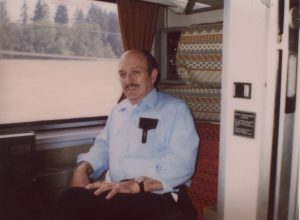 My dad, Al Spencer loved trains. I’m sure it all started with his dad’s job as a carpenter on the Great Northern Railway. Dad and his siblings rode the trains to school and such. It was one of the perks of his dad’s job. I know most kids like trains, but I think Dad maybe liked them more than most kids. He grew up around them.
My dad, Al Spencer loved trains. I’m sure it all started with his dad’s job as a carpenter on the Great Northern Railway. Dad and his siblings rode the trains to school and such. It was one of the perks of his dad’s job. I know most kids like trains, but I think Dad maybe liked them more than most kids. He grew up around them.
On May 1, 1971, a very exciting event took place, especially for my dad. It was on that day that the Amtrak train was born. It was originally established by the Congressional Rail Passenger Service Act, which consolidated the United State’s existing 20 passenger railroads into one. Of course, most of us know that the Amtrak train has since had a long history…49 years to be exact. Back then the Amtrak train line served 43 states with a total of 21 routes. These days they not only handle traditional interstate passenger rail in 46 states, but they also operate high-speed trains along their busiest route, the Northeast Corridor from Washington DC, to Boston. With more than 500 destinations throughout a 21,000 mile system, Amtrak has grown to 33 routes across America. Nevertheless, the Amtrak train system was always focused on getting from Point A to Point B safely and swiftly, even in 1971.
From the time that first Amtrak rolled out of the station, my Dad was hooked. He knew he wanted to take a trip by way of that train. During the early years of the Amtrak, we heard a lot about it. It wasn’t going to be a trip that we went on as a family, but rather a special trip for Dad and Mom. That trip would finally happen in about 1991, when Mom and Dad took the Amtrak from San Diego to Seattle. My sister, Caryl Reed and her family lived there at the time, and they would spend time visiting with them after the train ride. My dad was so excited!! In fact, he was the epitome of “the kid in the candy shop.” I can see why he would be so excited. After  all, he had waited twenty years for that trip. I suppose that prior to that time, he couldn’t think of any reason to take the trip, but when my sister moved to Bremerton, Washington, the time had come. Mom and Dad made many trips to Washington in those years, but that trip on the Amtrak Train really was the most exciting way for them to travel.
all, he had waited twenty years for that trip. I suppose that prior to that time, he couldn’t think of any reason to take the trip, but when my sister moved to Bremerton, Washington, the time had come. Mom and Dad made many trips to Washington in those years, but that trip on the Amtrak Train really was the most exciting way for them to travel.
I can picture my dad now. Not how he looked. I have a picture of that. No…I can picture how he felt. He was that “kid in the candy store” again. I could picture him feeling like he was back in Superior, Wisconsin, hopping the train, even though he had a pass to ride the train.
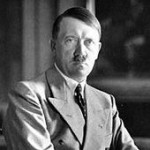 One of the most evil dictators of all time was Adolf Hitler. He not only wanted control of the world, but he decide that there were a number of people who had no right to live. To him, only the Aryan, or Master Race was of value. Hitler’s “Master Race” is a concept in Nazi ideology in which “the putative Nordic or Aryan races, predominant among Germans and other northern European peoples, are deemed the highest in racial hierarchy.” Hitler was obsessed with the idea of removing anyone who did not fit into that definition of the Master Race…especially the Jewish people.
One of the most evil dictators of all time was Adolf Hitler. He not only wanted control of the world, but he decide that there were a number of people who had no right to live. To him, only the Aryan, or Master Race was of value. Hitler’s “Master Race” is a concept in Nazi ideology in which “the putative Nordic or Aryan races, predominant among Germans and other northern European peoples, are deemed the highest in racial hierarchy.” Hitler was obsessed with the idea of removing anyone who did not fit into that definition of the Master Race…especially the Jewish people.
Hitler was insane, and in reality, insane is not a strong enough word for it. I don’t think that most of us could conceive of the level of evil that possessed Adolf Hitler. He didn’t care who died to bring about his plan for the world. He expected sacrifice from his people, unquestioned sacrifice. Meanwhile, Hitler himself was always safely hidden away…protected from his enemies…the people who disagreed with his evil cruelty. Hitler had often said that his Third Reich would be a 1,000-year Reich. He was determined to have a legacy that would span the ages. Well, he is remembered I suppose, but with disdain.
I’m sure Hitler had several places that he hid in, but one of them, a refurbished air-raid shelter seemed to be 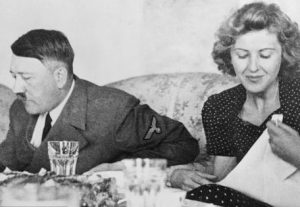 his bunker of choice. Hitler had gone into his bunker on January 16, after deciding to remain in Berlin for the last great siege of the war. He knew he was losing, but coward that he was, had no intention of being arrested. Fifty-five feet under the chancellery, where as chancellor, he lived, was his shelter. It contained 18 small rooms and was fully self-sufficient, with its own water and electrical supply. During that time, he left only rarely (once to decorate a squadron of Hitler Youth) and spent most of his time micromanaging what was left of German defenses and entertaining such guests as Hermann Goering, Heinrich Himmler, and Joachim von Ribbentrop. At his side were Eva Braun and his dog, an Alsatian named Blondi.
his bunker of choice. Hitler had gone into his bunker on January 16, after deciding to remain in Berlin for the last great siege of the war. He knew he was losing, but coward that he was, had no intention of being arrested. Fifty-five feet under the chancellery, where as chancellor, he lived, was his shelter. It contained 18 small rooms and was fully self-sufficient, with its own water and electrical supply. During that time, he left only rarely (once to decorate a squadron of Hitler Youth) and spent most of his time micromanaging what was left of German defenses and entertaining such guests as Hermann Goering, Heinrich Himmler, and Joachim von Ribbentrop. At his side were Eva Braun and his dog, an Alsatian named Blondi.
Hitler was a coward, who put his men out on the front lines to do his evil bidding, while he hid behind the scenes, so that the opposing armies couldn’t get to him. He thought he had it all planned out. but as April 1945 came to a close, his “1,000 year Reich” was collapsing and enemy soldiers were closing in to shut him down. So, he married his long-time girlfriend, Eva Braun on April 28, 1945, and two days later they committed suicide together. He was warned by officers that the Russians were only a day or so from overtaking the chancellery. 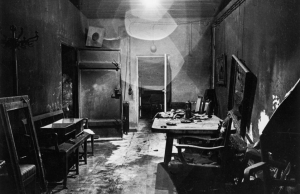 They urged him to escape to Berchtesgarden, a small town in the Bavarian Alps where Hitler owned a home, but he instead chose suicide. It is believed that both he and his wife swallowed cyanide capsules…which had been tested for their efficacy on his “beloved” dog and her pups. Then, just to be sure, he shot himself with his service pistol. The couple’s bodies were cremated in the chancellery garden by the bunker survivors, as per Hitler’s orders and it was reported later that they were partially recovered by Russian troops. Still, that didn’t prove to many that he was dead. Finally, a German court officially declared Hitler dead in 1956. Finally the world was rid of a despicable piece of garbage.
They urged him to escape to Berchtesgarden, a small town in the Bavarian Alps where Hitler owned a home, but he instead chose suicide. It is believed that both he and his wife swallowed cyanide capsules…which had been tested for their efficacy on his “beloved” dog and her pups. Then, just to be sure, he shot himself with his service pistol. The couple’s bodies were cremated in the chancellery garden by the bunker survivors, as per Hitler’s orders and it was reported later that they were partially recovered by Russian troops. Still, that didn’t prove to many that he was dead. Finally, a German court officially declared Hitler dead in 1956. Finally the world was rid of a despicable piece of garbage.
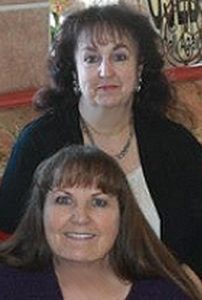 Written by guest author, Cheryl Masterson
Written by guest author, Cheryl Masterson
My sister, Caryn Schulenberg is a woman of many characteristics, interests, and capabilities. I will tell you a tiny little bit about her.
For one, she is the most determined and self-disciplined woman I know! When she makes her mind up to do something, she does it, and she does it well! She can stay on a diet like a world champion! She never lets her weight get very far out of hand, and when she goes over a ways, she goes on a diet, and there is nothing that will get her off that diet until she has reached her goal! She walks, hikes and stays in shape. She’s such a good example that her husband, Bob, has joined her in this determination and self-discipline over the years just to keep up with her!
She can write, and she is a good writer! She decided to start this blog many years ago, and she never fails to write something every single day of every single year! That’s determination, and self-discipline! She finds something that interests her, and she writes about it! She has many, many followers on her blog! Some of her stories are funny, some are sad, some are just good information to know, but all are interesting and keep her followers entertained and informed. Her writing also satisfies the need in her “to know.” She likes to know about so many things!
Caryn is unendingly compassionate, giving, caring, and very protective of her family, friends and loved ones! She will help anyone with anything they ask her for help with, and I do mean, anything. She will do her best, and give you all she has to give, even if she doesn’t know anything about what you have asked her to do! She will find out how to do it, and then, go do it! If she says she will do it, she will! She is a woman who can be counted on, and she never gripes, moans, or complains about anything that is asked of her, either. She just does it, or gives it. That’s it!
One of the times her compassion and understanding of, and for, her sisters and her Mother, and her protectiveness toward us, strongly came to her aid and helped her to take on a task the rest of us absolutely cringed from taking on because it was so devastating for our entire family. That happened when our Dad, Allen Spencer, was sick and in the hospital for 4 months! So sick they told us he would die! Any of you who know us very well, know about that time in our lives, because Caryn wrote about it quite a bit after it was over. But from my point of view, this is how Caryn handled that situation, and I, for one, will be forever grateful! We each 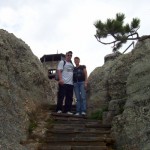
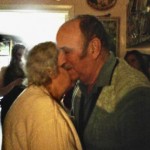 have our strong points, but Caryn took on the most hated, and horrible task I can think of during that time, and she did it for all of us! She dealt with the doctors! My sisters, our Mother and I all had, and have, the same faith in God Caryn has. Meaning we all believe the same way, and we are all strong in that faith. But I know, for myself, the emotional battering and harsh blows dealt to us by those well-meaning physicians as they reported to us several times a day, was far more than I could stand to receive first-hand! Those reports were truly aggressive and like physical blows in the beginning, and for quite a while! When none of us could bear to face their battering and horrifying, day to day reports, Caryn faced them, and most often, alone! And after she listened to them, and discussed their reports with them, she would then come and talk with us, and she always softened each horrifying report she received from them as much as she could, into a report we could better handle, softened with her faith in God, and pulling from us, our faith in God. Her ability to “run interference” between them and us, gave us the time we needed to compose ourselves, and get our minds on the Word of God, which is the most important thing we can do in our family, in a crisis! Her protective nature in the matter of the doctors sheltered us, and helped us all to continue to hope and pray in faith for our Dad and for his recovery! And he did recover! And he lived two more years in relatively good health, for which we are all so grateful to God! And I’ll tell you, Caryn not only listened to those doctors often horrifying reports, she told them she understood what they were saying, BUT . . . and then she would proceed to tell them what we believed, and gradually she turned every single one of those doctors and nurses to our side. Until they started to say the same things she was saying to them, and gradually, things began to change, and Dad recovered. Every one of those doctors and nurses remember her well, respect her, and always speak with her when they see her even yet today, 15 years later!
have our strong points, but Caryn took on the most hated, and horrible task I can think of during that time, and she did it for all of us! She dealt with the doctors! My sisters, our Mother and I all had, and have, the same faith in God Caryn has. Meaning we all believe the same way, and we are all strong in that faith. But I know, for myself, the emotional battering and harsh blows dealt to us by those well-meaning physicians as they reported to us several times a day, was far more than I could stand to receive first-hand! Those reports were truly aggressive and like physical blows in the beginning, and for quite a while! When none of us could bear to face their battering and horrifying, day to day reports, Caryn faced them, and most often, alone! And after she listened to them, and discussed their reports with them, she would then come and talk with us, and she always softened each horrifying report she received from them as much as she could, into a report we could better handle, softened with her faith in God, and pulling from us, our faith in God. Her ability to “run interference” between them and us, gave us the time we needed to compose ourselves, and get our minds on the Word of God, which is the most important thing we can do in our family, in a crisis! Her protective nature in the matter of the doctors sheltered us, and helped us all to continue to hope and pray in faith for our Dad and for his recovery! And he did recover! And he lived two more years in relatively good health, for which we are all so grateful to God! And I’ll tell you, Caryn not only listened to those doctors often horrifying reports, she told them she understood what they were saying, BUT . . . and then she would proceed to tell them what we believed, and gradually she turned every single one of those doctors and nurses to our side. Until they started to say the same things she was saying to them, and gradually, things began to change, and Dad recovered. Every one of those doctors and nurses remember her well, respect her, and always speak with her when they see her even yet today, 15 years later!
Caryn is a wonderful sister, wife, mother, grandmother and great-grandmother! She is always in your corner! She attends every event anyone invites her to if it’s at all possible. Birthdays, school performances, graduations, showers, weddings, births, funerals, parties, or whatever else is going on. She is there for her 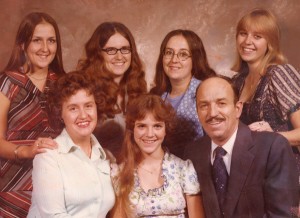 family and for her friends. She hates to disappoint anyone in any way! As I said before, she can be counted on even when no one else can.
family and for her friends. She hates to disappoint anyone in any way! As I said before, she can be counted on even when no one else can.
These are only a few of the zillion things I can think of to say about my sister, Caryn, but there isn’t enough room to put it all down on paper! This, at the very least, gives you a little insight into the kind of person she is, in case you didn’t already know! She is a blessing in every way to all who know and love her! Today is Caryn’s birthday, and I wish her the most wonderful kind of day, and a coming year that is blessed and happy beyond measure! Happy birthday, Caryn! I love you! We all love you! Have a great day!

 The reality is…raccoons are known pests. They tear through the trash. They eat food that is supposed to be for the dog or cat. They go into people’s homes by way of their doggy doors, and the resulting home invasion is disastrous. All that is true, but then you look at their antics, and I for one have a really hard time “hating” them. I know that lots of people will totally disagree with me, but just look at their cute little faces. No, I have not had a raccoon sneak into my house, but my neighbors have, and the stories they tell are…well, yikes!!
The reality is…raccoons are known pests. They tear through the trash. They eat food that is supposed to be for the dog or cat. They go into people’s homes by way of their doggy doors, and the resulting home invasion is disastrous. All that is true, but then you look at their antics, and I for one have a really hard time “hating” them. I know that lots of people will totally disagree with me, but just look at their cute little faces. No, I have not had a raccoon sneak into my house, but my neighbors have, and the stories they tell are…well, yikes!!
I suppose that their stories should have made me realize just exactly what pests raccoons are, but they really don’t know any better. They are just doing what comes naturally. As human take over more and more of the world, there is little chance of avoiding all interaction with 
 animals, and truth be told, I don’t think I would want to. For anyone who has stepped out their back door to see deer lounging in their yard, watched the squirrels on the power lines deliberately teasing the neighbor’s dogs to make them bark, the woodpecker pecking on the neighbor’s metal chimney early in the morning, and yes, the sneaky raccoon stealing your dog’s food, their antics are sometimes really funny. I love the videos of dancing deer, bears sitting at the picnic table, deer and cats playing together, and funny shots of animals in all stages of being startled by each other.
animals, and truth be told, I don’t think I would want to. For anyone who has stepped out their back door to see deer lounging in their yard, watched the squirrels on the power lines deliberately teasing the neighbor’s dogs to make them bark, the woodpecker pecking on the neighbor’s metal chimney early in the morning, and yes, the sneaky raccoon stealing your dog’s food, their antics are sometimes really funny. I love the videos of dancing deer, bears sitting at the picnic table, deer and cats playing together, and funny shots of animals in all stages of being startled by each other.
Yes, there are dangerous animals, and we would do well to keep our distance from them, but there are more animals who seem to have a wonderful sense of humor, and if we can get a peek at them when they aren’t 
 aware of us, we might see them in some of their funniest antics. The raccoon washing his bread before he easts it, even if it totally dissolves before it gets to his mouth, or laying lazily in a tree branch sleeping with its leg hanging over the sides. You might even get to see a little raccoon peeking at you from the tree branches where he is hiding. Yes, they are pests. Yes, they get into things, but they are just trying to share the space we all live in. Next time you are outside, take a look around you. You just might be surprised to see a wild animal being totally funny.
aware of us, we might see them in some of their funniest antics. The raccoon washing his bread before he easts it, even if it totally dissolves before it gets to his mouth, or laying lazily in a tree branch sleeping with its leg hanging over the sides. You might even get to see a little raccoon peeking at you from the tree branches where he is hiding. Yes, they are pests. Yes, they get into things, but they are just trying to share the space we all live in. Next time you are outside, take a look around you. You just might be surprised to see a wild animal being totally funny.

